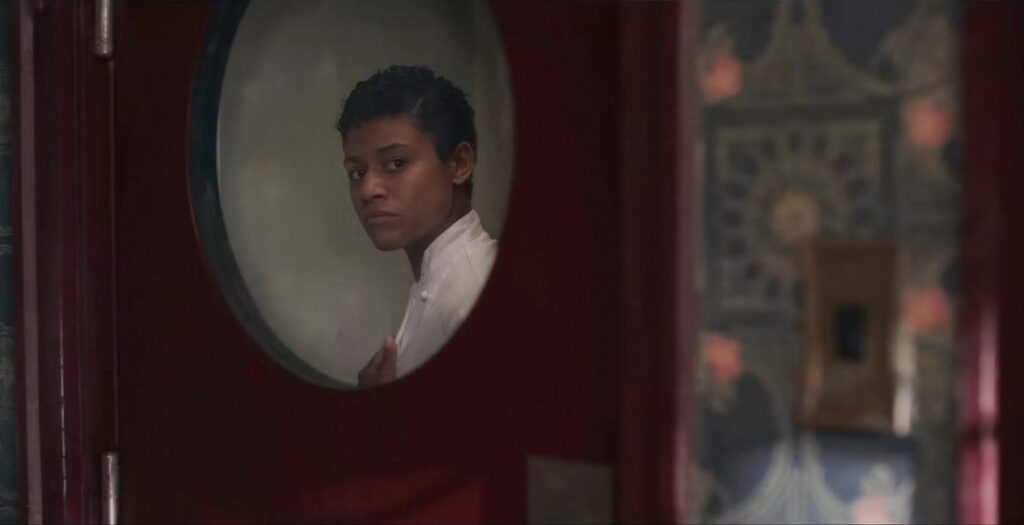From writing-directing duo Bridget Savage Cole and Danielle Krudy, House of Spoils follows an ambitious chef (Ariana DeBose) focused on achieving her dream: becoming the head chef of her own restaurant. Sous no more, Chef is given the chance of a lifetime if she’s willing to give up a job she’s worked for and a certain future or a dream. Partnering with a smarmy restauranteur (Arian Moayed), she opens a restaurant on a remote estate. Only, as she develops the menu, she is forced to handle kitchen chaos, crushing self-doubt, and the haunting mold that creeps across the home.
Surprisingly, House of Spoils is bewitchingly relevant. The film loudly points out how women harmed in all-male spaces turn their trauma on other women, completing a cycle they notably should break. Instead of compassion, they throw other women into the same fire they were hardened in instead of understanding that not everyone needs to be forged in the same way. This is the most salient part of the film and, ultimately, the theme that works the most throughout the film.
From the beginning, DeBose’s Chef performs the masculinity she has seen in the kitchen and adapts to survive. Throughout the film, Chef smartly doesn’t turn into an ultrafeminine professional. Instead, her edges round, and the performance ceases. What is left is still her, nontraditional and unyielding but propelled by her and her needs alone. It’s a transformation that works well when in conversation with Lucia (Barbie Ferreira), even if it can sometimes be left standing on aesthetic when alone.
The thoughtful piece is that the film confronts how women recreate cycles of sexism against other women without ever feeling too hamfisted. Instead, the comments that Chef makes toward her new sous chef are those that cut any woman who has been in a similar position and believe me; you don’t have to be in the culinary world to feel it.

Ariana DeBose threw herself into this role. Every emotional moment and vulnerable break is intense, and when House of Spoils begins to cool, DeBose’s acting pulls you back in. With moments of high emotion accented with culinary visuals, the food pushes uncomfortable moments into a higher stress level and makes relief feel even more calming.
The molding of food with scenes you can smell, the squelching sound of food being cut and eaten, the bugs tapping on the counter fighting over a meal—it all works. Alternatively, when Chef begins to find herself, the food follows suit. While it may initially be unappealing visually, when Chef gives way to instinct, it all begins to sing.
That said, House of Spoils is strung along on a pacing yo-yo. The constant point of investment is Chef. As you bounce between seeing a supernatural horror film, a fairytale, and a thriller, the pace and tone oscillate—slightly making the film bend to the worst elements of what happens when you create a genre-bending story. But it never hangs in the lull for too long, making it a fun time spent despite some inconsistencies.
With computer-generated hiccups that make the bugs feel more uncanny than unsightly for the right reasons and a tad too many repetitive expository components, House of Spoils isn’t a revolutionary film. But it is a witchy good time for the right reasons. It hits the right notes as a streaming horror film, and I don’t mean that as a slight. It quickly gets the audience in, works within the standard horror tension ramp-up, and then delivers a character-focused payoff.
While the film doesn’t fully evoke the folk horror I was craving nor steer too deeply into a violent thriller, it does make you jump and ultimately asks you to let go of the toxicity you’ve built up. The film’s takeaway is far and away stronger than its issues. From tip to tail, House of Spoils is just asking its audience to let that shit go—and you know what? That works.
House of Spoils releases on Prime Video October 3, 2024 and screened as a part of Fantastic Fest 2024.
House of Spoils
-
Rating - 7/107/10
TL;DR
The film’s takeaway is far and away stronger than its issues. From tip to tail, House of Spoils is just asking its audience to let that shit go—and you know what? That works.





